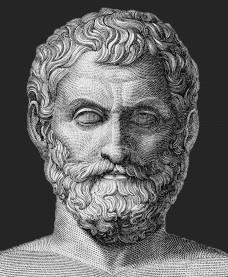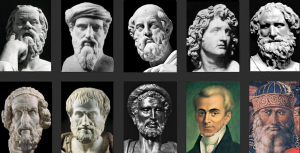
Philosopher, Mathematician, Physicist, Astronomer (c604 BC – c546 BC)
The first by chronological order Greek philosopher and the founder of European philosophy as a science of humanity. Thales claimed that he owed gratitude to luck for 3 things: First that he was born a human being, second that he was born a man and not a woman and third that he was born Greek, not barbarian.
Thales was born in Miletus at a time when the city had become an important trade centre. He used this advantage to travel to Persia and Egypt. He visited the pyramids, which he successfully measured their height using his own mathematical theorems, measured the distance from shore of ships to sea and came up with an explanation for the floods of river Nile, facing the Egyptians not only as tutors but as students as well.
Thales was portrayed as a wise researcher devoted to the study of science. Plato, for example, writes that one day Thales fell into a drain shaft as he was walking on the street while gazing at the sky while studying the movement of the stars.
What is special about Thales is his expertise in numerous fields. He did discoveries purely scientific in astronomy, physics and geometry; he established his own philosophical system and participated actively in politics. Concurrently, he performed great mechanical works and worked as a political supervisor of the Ionians.
He would frequently use his vast scientific knowledge to surprise people. In one example, in May 28th, 585 BC he predicted a total solar eclipse that stopped the battle between two opposing forces. Because of this feat, Thales’ reputation as a mathematician and astronomer grew enormously and was hailed as one of the 7 wide men of Greece. In another example, by studying and observing the stars, Thales correctly predicted that during the next autumn, the harvest from the olive oils would be significantly increased in comparison to the previous period. He proceeded to negotiations with the oil presses and succeeded in renting them for much higher prices than he himself had originally paid. In this way, Thales had used his astronomic knowledge in conjunction with economics in a way that no modern economist has done to this day. By then, philosophy had acquired a practical value thanks to Thales.
As a mathematician, Thales made radical discoveries in geometry most notably that the diameter divides the circle into two equal parts, that an isosceles triangle has its two basal angles equal, the intercept theorem and the well-known Thales’ Theorem. Even though some of them were already known and used by the Babylonians, Thales was the first to prove them mathematically and today they are considered as fundamental basics of geometry.
In the field of physics and astronomy, Thales always sought to find out the cause. Aside from his research on solar eclipse, earthquakes and floods, Thales’ major contribution in physics were his observations on the phenomena of magnetism and electricity. He is the first person recorded to have discovered electricity, the fact that two light objects could be attracted after being rubbed on amber. With this seemingly simple discovery, Thales was opening the gates to the unknown, which thousands of years later scientists of the Enlightenment would enter and explore.
As a philosopher, Thales is a Unitarian. He believes that the primordial substance of all is water. Everything we see comes from water and is a result of this substance’s simple transformation. Water as a primordial substance and all its products are not dead; they are life, full of energy and it is the water inside everything that is strongly connected to an energetic force, which in living beings is correspondent to the soul.
Thales of Miletus, scientist and philosopher, observer, researcher and experimentalist, founder of the Ionic school of philosophy and discoverer of electricity stands today in the first line of the wisest men in history of mankind. His most famous aphorism “Know thyself” (γνῶθι σ’αὐτὸν) guides all those scientists who wish to climb the stairs to wisdom.
Bibliography
- Manias, Theophanes. The Unknown Masterpieces of the Ancient Greeks. Athens: Pyrinos Kosmos, 2006. Print.
- Pleuris, Konstantinos. Greek Philosophers. Athens: Hilektron, 2012. Print.
- ”Thales of Miletus”. Helios. Passas, I.Athens. 1946. Print

[…] + λόγος/ the science of nature). Anaximenes was primarily influenced by his predecessors Thales and Anaximander but introduced his own principles in philosophy. He believed that air was the […]
LikeLike